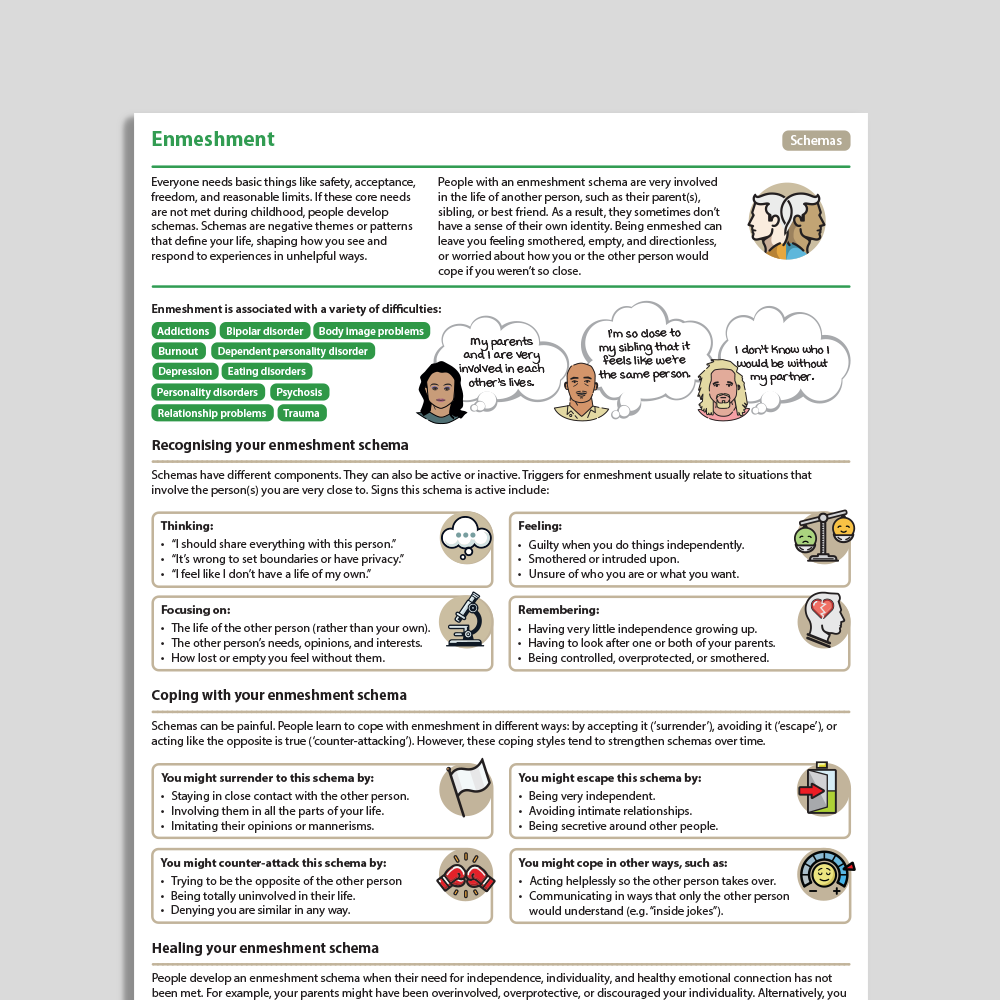30th April 2024 Newletter


Psychology Tools
Published
This week we're releasing two more resources from our Schema series, focusing on different early maladaptive schemas (EMS): Dependence/Incompetence and Enmeshment, as well as adding 5 new Hindi translations to our library. In our research roundup we highlight a couple of studies on risk factors and treatment targets for specific subgroups among adolescents.
Psychology Tools Schema Series
Launched earlier this year, our schema series breaks down the foundational ideas of schema therapy in an approachable and straightforward way. It also addresses the most common early maladaptive schemas (EMS) with a range of problem-specific handouts.
With illustrations, client-friendly explanations, and schema-specific examples, the handouts offer accessible guidance for those working with schema therapy in-session. They're also a great learning tool for anyone wanting to become more familiar with this approach.

Dependence / Incompetence
Individuals with a dependence / incompetence schema lack confidence in their ability to manage everyday tasks, face new challenges, or make decisions by themselves. As a result, they may feel anxious, overwhelmed, and reliant on others to function or survive.

Excessive involvement in the life of another person can impact an individual's sense of identity. Being enmeshed can leave them feeling smothered, empty, or worried about how they or the other person would cope without each other.

New Hindi Translations
This week we're releasing 5 new Hindi translations from our popular Cognitive Distortions Series. Translated resources include: All-Or-Nothing Thinking, Arbitrary Inference, Catastrophizing, and Cognitive Distortions – Unhelpful Thinking Styles(Common and Extended versions).
Research Summaries
-responsive.png)
Identifying high-risk subgroups for self-harm in adolescents and young adults
This study examined risk factors for adolescent self-harm, identifying distinct subgroups among young people. Notably, those with depression, whether diagnosed or not, showed elevated self-harm risk. Bullying also emerged as a pervasive risk factor across various subgroups, highlighting its detrimental impact. Substance use was also a potential marker for identifying at-risk individuals. While caution is needed in using subgroup findings for risk assessment, they offer valuable insights for clinicians. Armed with this knowledge, professionals might be better able to identify and support vulnerable youth, guiding their use of interventions to mitigate the risk of self-harm.
McEvoy, D., Brannigan, R., Walsh, C., Arensman, E., & Clarke, M. (2024). Identifying high-risk subgroups for self-harm in adolescents and young adults: a longitudinal latent class analysis of risk factors. Journal of affective disorders, 351, 40-48.

Gender- and sexuality-minoritized adolescents in DBT
How can therapy better support gender and sexuality-minoritized (GSM) adolescents? A recent study explored the unique challenges faced by GSM youth in the context of dialectical behaviour therapy (DBT). Three overarching themes emerged: identity, the impact of others, and space for sexual and gender identity in DBT. The study presents a number of useful intervention tasks and corresponding DBT skills/principles for addressing these issues. Importantly, it highlights the importance of therapist awareness, safe therapeutic spaces, and integrating GSM-related difficulties into DBT. The findings offer crucial insights for therapists who work with GSM youth, highlighting the need for knowledge, competence, and sensitivity.
GSM young people felt issues related to identity confusion and acceptance, alongside how to cope with and change cis-heterosexist behaviours and reactions by others, contributed to their distress and thus were important to target in DBT. Participants also reported that it was important for DBT therapists to provide support and promote a sense of safety in order to help bring sexual- and gender-identity-related issues into therapy. These represent important recommendations for DBT therapists when supporting GSM adolescents.
Camp J, Morris A, Wilde H, Smith P, Rimes KA. Gender- and sexuality-minoritised adolescents in DBT: a reflexive thematic analysis of minority-specific treatment targets and experience. The Cognitive Behaviour Therapist. 2023;16:e36. doi:10.1017/S1754470X23000326
Get sent more useful pieces like this!
Sign up to our monthly newsletter full of helpful ideas, tools, and tips for mental health professionals like you. You'll find out about our latest resources, and you can also read our reviews of the latest research.
It's completely free and you can unsubscribe at any time.